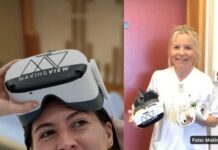Last year, it has become apparent that information, swung by people with and without power, is truly a double-edged sword capable of cutting deep wounds into the cultural foundation in our society.
(Skrevet av Tone S. Ringstad, Leif Edvinsson and Jakob Elander)
We now wake up finding ourselves in a new chaordic state of 2017, where confusion, disillusion and even fear is the new normal, and at the same time the primal scream of the need to consolidate and that of new societal opportunity is stronger than ever.
Professor Dan Siegel, UCLA, reflected as follows, when he was asked whether he belonged in America, his answer was: “I thought how isolated we all are and how disconnected we feel,” he says. “In our modern society we have this belief that mind is brain activity and this means the self, which comes from the mind, is separate and we don’t really belong. But we’re all part of each others’ lives. The mind is not just brain activity. When we realize it’s this relational process, there’s this huge shift in this sense of belonging.” This is also called Relational Capital – and can be argued being one of the foundations in a working society.
When Relational Capital (or relational quality in the culture) deteriorates, one must find courage and tools to understand the driving forces and vectors behind this deterioration. In 1997 on Malta, the election at hand resulted in a very surprising outcome. Without going into detail, the leadership asked themselves why and how that could happen. In a quest to find answers, the head of the Catholic Church Intelligence unit based on Malta, dr. Benjamin Tonna, decided to assess the culture and the values in motion in the society. He was able to document a change in culture through this period of a “stunned society”, and found it to affect both economical, political and everyday life in Malta. The final outcome highlighted the awareness that the relational quality in the culture was the driving force of the society, not the individual strengths and qualities.
I would argue that in our society today we have an urgent need to deeper understand some of our driving forces and underlying value priorities in our own part of the world and how they interrelate. In order to understand, we need to examine the underlying values that drive our culture. Often we are challenged by values dilemmas, with no obvious right answer, such as
- What are more important to people; loyalty to what has been, or change willingness to something new and unknown?
- What has the higher focus; economic profit for few, or equality for creating a more balanced and equal society?
- What would people vote for; being safe with similar people to ourselves, or having a more diverse society with a higher mix of cultural and geographical differences?
- Where do we set our visionary thinking for the future; digital efficiency or human, caring relationships?
When we have an indication of our own cultural maturity it is time to examine the drivers of our society. Using cultureengine.no as a mapping tool, we can step up the game and examine values drivers of teams, companies and societies. This insight can then be used to find cultural gaps and opportunities, which can in turn be translated into new forms of partnerships (Relational Capital) and formation of teams and societies that work together and work for each other. This approach would be a solid platform of driving the prototyping of societal innovations for our future, as advocated by the New Club of Paris.
SO How does this impact leadership?
When World Economic Forum in 2015 released its Outlook on the world agenda, number 3 top trend is the “lack of leadership” in the world. Leaders, and people in general, are challenged by the fact that the world is rapidly changing and struggle to navigate in a more and more chaotic environment where values and principles increasingly overlap. In such a setting it is extremely difficult to prioritize when presented with multilayered and overlapping goals.
It can be argued that it is time that leaders look internally and ask themselves what values they are being guided by. There will always be personal dilemmas between shared goals and individual goals. Iif we let the shared goals be invisible for a long enough time because we cannot agree to what they should be, the individual goals will win – and people will start acting based on their own agenda.
Learnings from creating order in a “mixed goal” setting can be found from the innovative approach of Swiftcourt Arbitration processes, where digital tools are married with top mediation and arbitration tools. The tools employ a strong focus on shared understanding to create shared goals and to bring the parties closer together. At best, the process creates reconciliation between the parties and a landscape in which a road forward can be mapped out based on common goals and visions.
With the access to a cultural gaps analysis and the learnings from digital arbitration and mediation it would be possible to use the same type of concepts on the people of a city, a board of directors or an executive team to find common grounds between goals, world views and culture. The established common understanding could in turn, if used in a structured way, build “knowledge bridges” used for transferring understanding and, actually building on team diversity, mapping of common goals and visions how to go forward. The key to such societal innovation diplomacy must however be knowledge of values of people and take its starting point in finding the present cultural gaps in society and create arbitrational bridges.
So where do you start? You can start by taking a deep look at your own values priorities and how your values craft in Thought Leadership. Next step might be to have your own and your colleagues values mapped, called Executive Vector! This would allow a new societal leadership navigation to emerge based on values mapping, arbitration systems and diplomacy. The result might be a more constructive peace innovation approach to the future, and for our future generations.









